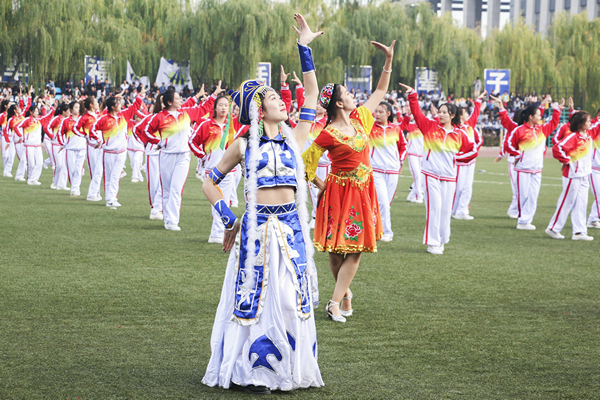Celebrating four decades of diversity and excellence


This year marks the 40th anniversary of North Minzu University, located in Yinchuan, Ningxia Hui autonomous region. Over the past four decades, the university has educated more than 80,000 students from across China and around the world.
According to university President Li Junjie, NMU currently hosts over 23,000 students from 31 provinces and 53 ethnic groups, making its diverse cultural background one of the institution's most distinct features.
"At one point, we had all 56 ethnic groups represented on campus," said Li Hui, a professor in the School of Chemistry and Chemical Engineering at NMU. "Each ethnic group brings its own unique culture and clothing. During school events, for example, students from the Uygur ethnic group in Xinjiang and those from the Mongol ethnic group in Inner Mongolia perform traditional dances, creating a sight exclusive to our university. This offers a charm that is different from hip-hop or jazz performances."
Due to its diverse student composition, NMU has naturally evolved into an ideal setting for the study of ethnology, which explores the characteristics of various peoples, their differences, and their relationships.
Guan Yi, a 22-year-old member of the Manchu ethnic group and a soon-to-be senior majoring in ethnology, explained that their curriculum includes cultural anthropology, sociology, and Chinese ethnography.
She mentioned that they encounter a clash of various ethnic cultures almost every day, whether through direct interactions or by observing different customs and attire.
"This immersive experience enriches our studies by prompting reflection and broadening perspectives," she said, adding that this major has deepened her understanding of her own ethnic group and personal identity.
Guan also emphasized the importance of this discipline for students of the Han ethnic group — China's largest ethnic group.
"By learning about other ethnic groups, people can appreciate and respect differences, ultimately contributing to national unity on a larger scale," she explained.
Community building
In addition to building a strong ethnology department, the university has also developed courses and exhibitions aimed at strengthening the sense of community among different ethnic groups in China. Guan is one of the exhibition guides.
"Through my narration, I hope to enhance people's recognition of Chinese culture, the Chinese national community, and our shared heritage," she said.
According to Li Hui, a diverse student body not only facilitates cultural exchange and preservation but also cultivates an inclusive and open-minded outlook, which is essential for progress and innovation.
She also noted that both the engineering and chemistry programs at NMU are ranked in the top 1 percent of the Essential Science Indicators (ESI), a widely recognized tool for assessing the global academic standing and influence of universities, academic institutions, and regions.
"Diversity is a key aspect of our institution," she said. "But most importantly, we are committed to comprehensive development. The international recognition we receive, reflected in the frequency of citations in our articles as shown by the ESI, underscores our standing in various fields."
Li Junjie highlighted NMU's proactive engagement with the Belt and Road Initiative and its openness to the global community.
According to him, the university currently has international students from 12 countries. It has also been collaborating with Chiang Mai University in Thailand for over a decade.
"Our software engineering program — the first China-foreign cooperative education program in Ningxia — has enhanced the friendship and educational exchange between China and Thailand," he said.
"Our students and faculty will continue to work toward transforming the university into a high-standard, modern, and comprehensive institution with distinctive characteristics."
Contact the writers at [email protected]




































